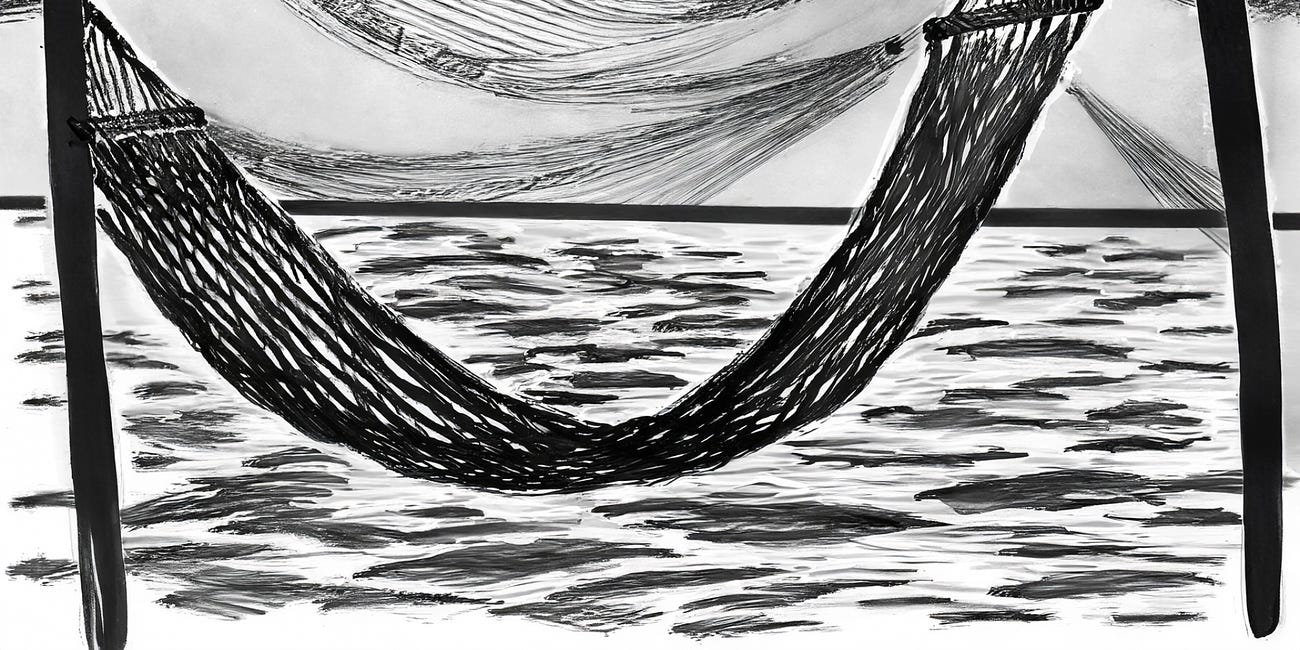Hello PNP’ers, and welcome to the fifth entry in my retros series, in which I revisit past stories, share inspirations, influences, choices, and — sometimes — brutally criticize myself. These are a way to realize the ‘meta’ content of the Clancy Steadwell character in a way I hope PNP’ers will find intriguing, satisfying, and — most of all — honest.1
The story subject to retrospection in this edition: O.K. hammock.
I love O.K. hammock. I think it is the most underrated of my stories in terms of engagement, popularity, and reception. I really mean that.
The writing of this story came just a month after writing khakis, which I explained in my last retro felt like a coming-of-age in my Substack adventure as a writer. O.K. hammock is a mining of the vein opened up by khakis. It once again features David and Rachel, and although it doesn’t have a childhood segment, it does have a framed narrative.
When I first posted this story, I warned in a Note that it contained sex, and while it does, I am not really sure whether it qualifies as having a sex scene or otherwise anything ‘spicy’ of that nature. But the intimate and frank descriptions of sex in both action and conversation maybe had a role in putting off some people from this one.
Hopefully after this look back at O.K. hammock I still harbor these same positive feelings about it, and maybe some more readers will discover this gem of mine if they don’t mind sex stuff.
Let us retrospect…
My father-in-law Bill’s tale of how my wife was conceived ranks high on my list of most unwanted anecdotes. But when he asked if I had heard it before, for some reason my brain could not parse an answer other than ‘no,’ and the inflection with which I said it somehow belied interest rather than the cold hostility I felt towards knowing how my father-in-law and mother-in-law had sex one time.
That first sentence is a great draw for Substack fiction. A reader will immediately think, ‘okay, I need to hear this story’.
I am a little disappointed, though, with my period-conjunction combo here of:
anecdotes. But
I think it should really be anecdotes, but. I think I went with the period because the brain may run out of reading breadth on the rest of the paragraph if not, which would be one long sentence. I do like the rest of the sentence though, particularly the use of the word parse, although cold hostility is maybe a little cliché. I could have maybe dropped cold as an adjective.
My blissful ignorance was shattered as he chuckled and offered up the account, unsolicited:
“I was working a job in town, so I decided to come by the house for lunch. But Anne, well, she wasn’t expecting me. So I get back, and she’s in the shower, right? So I hid behind the door, and when she came out I grabbed her from behind when she was in her towel, freaked her right out, thought I was an intruder or something. Let’s just say I didn’t have time for lunch!”
In writing my novel, I found that I do this a lot with colons, forming a bridge between a narrative clause and the quoted speech. Does it work? Personally, I think it usually does, and I think it works here.
This story was based on a friend of mine who had their father-in-law relay a very similar story as to how his wife was conceived and I held on to it as a potential kernel fitting for a story, and this is very much the small grain of truth around which the story weaves itself.
Some may simply call this ‘clumsiness,’ but as someone who lives it, I know this deficit runs deeper and into other facets of life in ways that ‘clumsiness’ does not account for.
…
I held the drill up the lathe, carefully aligned it with the screw. But at the penultimate moment, I overcompensated and drilled it in at a slight angle, splitting the wood.
The clumsiness thing here is definitely derived from my real life, although I think that first paragraph is a bit of foreshadowing with regards to sexuality, which, hey, I’m not to say whether I am sexually clumsy or not.
I love the symbolism of the second part, though, with the angle of the screw, another bit of foreshadowing. This is something that I didn’t anticipate when I wrote it, one of those magical sort of flow-state bits where you don’t even understand how what pours out of you manages to fit so well, it just does.
“It would definitely make them comfortable in the presence of animals,” she said, as our cat took up his usual position on the bedside table. For some reason he always watched and always purred loudly.
My animals in real life ALWAYS WATCH and sometimes even get jealous. It’s a real problem.
We stripped down to our minimal attire and hopped into bed. I liked the scheduling we had implemented for our sex life since deciding to try for a baby, harmonizing ourselves with ovulation and setting goals to try several times per week, usually before bed. It allowed me to prepare my mind and body for the encounters in a way that the spontaneous, more romantic encounters that Rachel preferred did not. It was always upsetting when she suddenly got in the mood only for me to have to pee, or find I needed a shower, or have to coerce myself into a playful mood after a bad day at work, at which point the romanticism of the moment was usually washed away, and the quality of our sex seemed to suffer.
I think this is definitely true for me in real life and I think that shows in the quality of this paragraph, but I can see how annoying it is for an S.O. who would prefer more spontaneous and romantic encounters. I don’t think it’s uncommon, though, for this preference to develop in one or more partners after a relationship has been ongoing for some time.
The one time I had given Rachel an orgasm via penetration was a legendary tale in the canon of our relationship. I closed my eyes and put my forehead on her stomach, recalling the exact circumstances of what happened that time, years ago, in a hammock by Kinderhook Lake.
Damn. Reading this and the paragraphs preceding it is what really makes me wonder if this piece was too intimate. Rachel uses the word ‘cumming’ unironically and David alludes to his own sexual incompetency, which is, as a male writer, a vulnerable thing to write about. I think if you were reading this more as a veiled autofiction of my own life, it comes across as way too private and personal. The truth is that the only way that I can write something like this is because it’s fiction. This conversation never took place in my life.
The only thing I can say is that my S.O. read this and it was so far away from anything that actually transpired between us that they took no issue with it at all, despite its personal nature.
This was no problem for our young bodies, which were opposite poles of a magnet.
Is this a good metaphor or nah? I’m not sure.
The fabric of the hammock ensconced us on both sides; it seemed like we were in our own little cocoon, like only the gods could see us.
Some people picked this out as their favorite quote. I like the use of ensconced and the comparison to a cocoon, which anyone who has ever inhabited a hammock will agree with. I’m not sure about the gods could see us.
What gods? Why? Are they voyeuristic gods of Kinderhook Lake?
(Also, after swimming in the lake and shifting her bikini bottoms to the side, it seems poor Rachel might get a UTI.)
The rest, as they say, was history. Local history.
I like this part. This is a fortuitous end to the flashback that arose in the moment of writing that I think nicely interweaves David’s lame proclivities for local history with the story of Rachel’s orgasm in the hammock.
More interesting to me is that Kinderhook Lake and this local history anecdote from David also come up in my coming novel, the big T. I do have a small personal connection to Kinderhook Lake, although not as big as one as including it in a short story and a novel would imply, so maybe I need to reexamine my real life connection to it.
I tried to inhabit the same angles of that time in the hammock, the way it cradled us and positioned my hips, how close we were to each other, how I tried to keep it from rocking and alerting any neighbors to our activities.
I think the use of how twice in this sentence is apparently an example of anaphora, which I’ve learned is a thing I like to do. I should have changed the way it to how as well for the first clause, to make it a little more pronounced.
This harkens back to the angle of the screw and David’s positioning of his body in three-dimensions and is really the loop that closes up the story. This relationship between past experiences and the present, how we retain sensory input and apply them in the future, is often central to my stories.
It’s not a story I’d tell a son-in-law someday, but we knew for sure we’d created a child with love.
I like how the very last sentence dovetails with the idea presented in the very first sentence of this piece.
The whole idea of an orgasm during intercourse being key to conception between two loving people is a romantic but ultimately flawed premise. Lots of babies are birthed into loving homes via surrogate or non-orgasmic methods.
The point is: sex is all about angles, people.
thanks for reading. what did I miss? read ‘O.K. hammock’ and let me know if there’s anything else you’d like covered.






Such a great story. I love that you go back and critique your stuff, too. I love how you give the feeling that the relationship has matured, but they are still very much in love and comfortable together.
Very enjoyable, Clancy. Love the thought process and musings on your own words.
"I found that I do this a lot with colons, forming a bridge between a narrative clause and the quoted speech. Does it work?"
Yes! Definitely works for me. I've read plenty of authors who do similar.